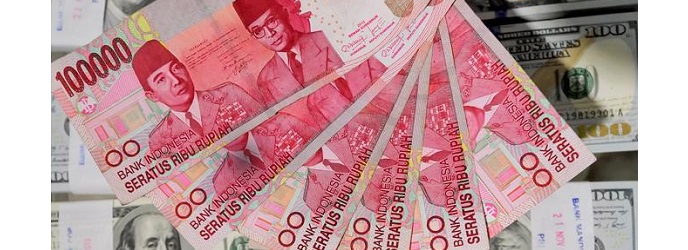Indonesian Rupiah Flirting with IDR 13,000 per US Dollar Level
The Indonesian rupiah is extending its strong performance. On Monday morning (14/03), Indonesia's currency has been flirting with the IDR 13,000 per US dollar level. According to the Bloomberg Dollar Index, the rupiah had appreciated 0.48 percent to IDR 13,012 by 09:25 am local Jakarta time. The rupiah is one of the "commodity-sensitive" currencies that are feeling the positive impact of rising crude oil prices. Meanwhile, Indonesia's benchmark Jakarta Composite Index rose 0.52 percent after opening of trade on Monday.
Although oil prices are rather flat - or actually slightly weaker - on Monday, emerging market currencies are still responding positively toward the strong gain in crude oil prices that occurred last Friday when Paris-based International Energy Agency released a statement that mentioned the oil market may have hit bottom. As a result, Brent went beyond the USD $40 per barrel mark. Global crude oil prices have now been rallying for three-four weeks, further and further away from 12-year lows that were touched earlier this year.
Crude Oil Price:
Asian stocks are in green territory on Monday, led by Japan's stocks, supported by higher oil prices, rallying stocks on Wall Street and positive macroeconomic data from China and Japan.
Japan's machinery orders were better-than-expected (+15 percent month-on-month). This causes optimism because these orders are considered a way of measuring capital spending over the next six to nine months, implying that Japan's economy may improve later this year (while a near-term slowdown remains likely).

Today, the Bank of Japan will start its two-day policy meeting. Markets expect the central bank to continue its newly adopted negative interest rate policy. However, it may decide to exempt USD $90 billion in short-term funds from this policy.
Although several economic data from China continue to signal contraction, there are some positive signs as well. Over the weekend it was announced that China's fixed-asset investment rose 10.2 percent year-on-year (y/y) in the first two months of 2016. China's improving investment and real estate sector make it seem like China is returning to its earlier growth model. However, the nation's manufacturing output in the first two months expanded at its weakest pace since 2008, while China's retail sales climbed at their slowest rate since May 2015.
